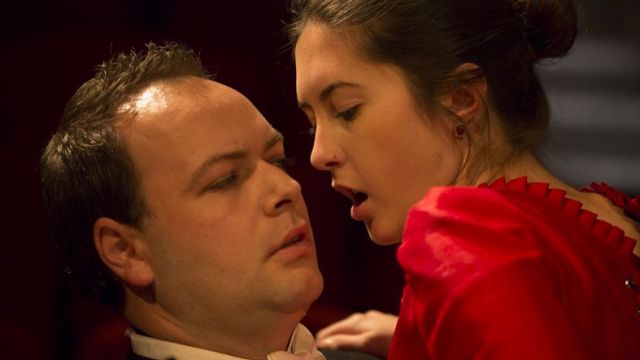Miss Julie & After Miss Julie
How does one stage a play about trapped, unhappy, combative individuals without leaving one's audience feeling equally trapped and unhappy and emerging with the feeling that they've just survived a war with relatively little to show for the victory?
Strindberg's Miss Julie, as staged in two versions by the University of Adelaide Theatre Guild, is a psychologically valid tale about believable people in credible situations and relationships. The three character roles are performed with great focus and intensity, the set and its props are impressively detailed and evocative, Scott Cleggett's lighting design is striking at times, and Ben Todd's costumes are simply superb.
All of these elements would seem to amount to an easy recommendation - and yet - the experience of sitting through successive versions of Miss Julie's tale of woe and strife was something of an endurance test for this critic. Perhaps drama students and scholars would find it enlightening and exciting to view and compare two (ultimately very similar) versions of the same story on the one evening, but a general audience is more likely to find it enervating and exhausting.

The dilemma that aristocratic Julie and her father's man-servant Jean encounter in their doomed attempt to obey their hearts is not one inextricably bound to Strindberg's time or place, but this is still a text that requires audiences to project themselves into the past in an attempt to empathise with social conventions that will seem largely foreign to us in 2014. Empathy and imagination are useful human qualities that a lot of great theatre pieces demand from their viewers, but it becomes increasingly difficult to see Julie and Jean's situation in the kind of apocalyptic terms that they themselves are forced to view it in.
This tends to leave the play and its people stuck in the past, whether in the original Strindberg setting or the updated perspective of Marber, while the audience remains in the present, dispassionately watching at a distance. The characters are not free to simply break the restraints imposed on them by their birth and their upbringing, though they may try - and the audience is barely able to take a breath or look away from the unfolding tragedy - but as tragedies go, Miss Julie, from today's perspective, seems like too much woe and not enough justification for it.
 The concentrated and claustrophobic nature of this story demands performers of great strength and stamina as well as sensitivity. In general, Rosie Williams, Cheryl Douglas and Nick Fagan are to be commended for demonstrating all of the aforementioned qualities. Whatever dissatisfaction arises from the characters' actions and words can be traced back to the inherent nature of the text, rather than to performance or direction. The two women are given the opportunity to play both female roles, and it is difficult to declare one interpretation or another either superior or inferior.
The concentrated and claustrophobic nature of this story demands performers of great strength and stamina as well as sensitivity. In general, Rosie Williams, Cheryl Douglas and Nick Fagan are to be commended for demonstrating all of the aforementioned qualities. Whatever dissatisfaction arises from the characters' actions and words can be traced back to the inherent nature of the text, rather than to performance or direction. The two women are given the opportunity to play both female roles, and it is difficult to declare one interpretation or another either superior or inferior.
Whether or not one is absorbed by the story told in Miss Julie, it is difficult to imagine that anyone would fail to be at least slightly distracted by the decision to keep ambient music playing throughout the lengthy first scene of the play. It is a constant struggle to maintain focus on important exposition when the dialogue is battling with what sounds like an accordion sea-shanty playing on a loop. In that sense, seeing a second version on the same evening has a certain usefulness, if only to attempt to catch what you missed the first time around. The Marber version substitutes swing jazz in the same scene, which is, thankfully, somewhat easier to tune out. The music does serve an artistic and dramatic purpose, but it either needs to be turned down to a minimum, or else dropped entirely.
If it possible to recommend Miss Julie, that recommendation would be that you experience the story one interpretation at a time, and if the idea of seeing the other one intrigues you, then pay a return visit by all means.
Anthony Vawser
Subscribe to our E-Newsletter, buy our latest print edition or find a Performing Arts book at Book Nook.

